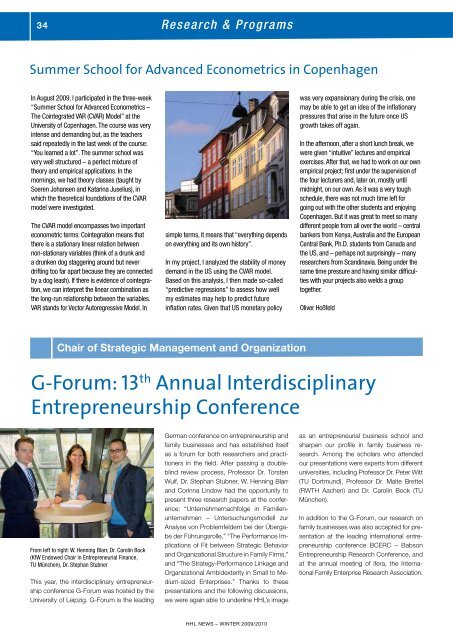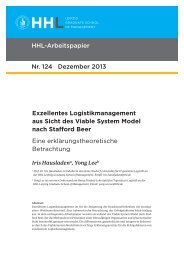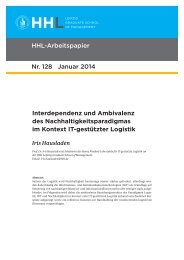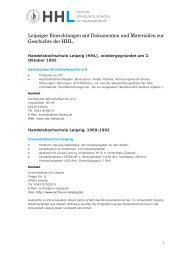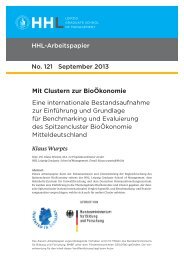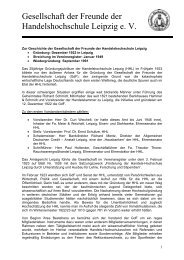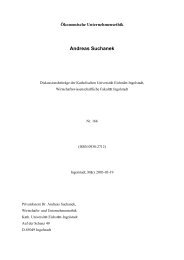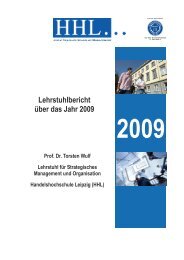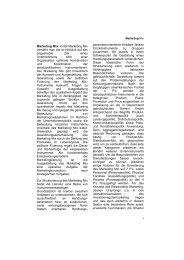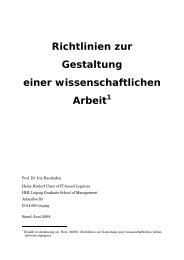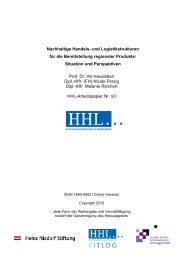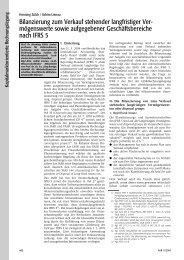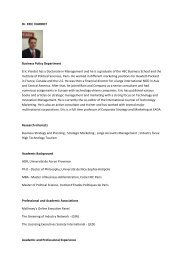Students - HHL Leipzig Graduate School of Management
Students - HHL Leipzig Graduate School of Management
Students - HHL Leipzig Graduate School of Management
You also want an ePaper? Increase the reach of your titles
YUMPU automatically turns print PDFs into web optimized ePapers that Google loves.
34 Research & Programs<br />
Summer <strong>School</strong> for Advanced Econometrics in Copenhagen<br />
In August 2009, I participated in the three-week<br />
“Summer <strong>School</strong> for Advanced Econometrics –<br />
The Cointegrated VAR (CVAR) Model” at the<br />
University <strong>of</strong> Copenhagen. The course was very<br />
intense and demanding but, as the teachers<br />
said repeatedly in the last week <strong>of</strong> the course:<br />
“You learned a lot”. The summer school was<br />
very well structured – a perfect mixture <strong>of</strong><br />
theory and empirical applications. In the<br />
mornings, we had theory classes (taught by<br />
Soeren Johansen and Katarina Juselius), in<br />
which the theoretical foundations <strong>of</strong> the CVAR<br />
model were investigated.<br />
The CVAR model encompasses two important<br />
econometric terms: Cointegration means that<br />
there is a stationary linear relation between<br />
non-stationary variables (think <strong>of</strong> a drunk and<br />
a drunken dog staggering around but never<br />
drifting too far apart because they are connected<br />
by a dog leash). If there is evidence <strong>of</strong> cointegration,<br />
we can interpret the linear combination as<br />
the long-run relationship between the variables.<br />
VAR stands for Vector Autoregressive Model. In<br />
Chair <strong>of</strong> Strategic <strong>Management</strong> and Organization<br />
G-Forum: 13 th Annual Interdisciplinary<br />
Entrepreneurship Conference<br />
From left to right: W. Henning Blarr, Dr. Carolin Bock<br />
(KfW Endowed Chair in Entrepreneurial Finance,<br />
TU München), Dr. Stephan Stubner<br />
This year, the interdisciplinary entrepreneurship<br />
conference G-Forum was hosted by the<br />
University <strong>of</strong> <strong>Leipzig</strong>. G-Forum is the leading<br />
simple terms, it means that “everything depends<br />
on everything and its own history”.<br />
In my project, I analyzed the stability <strong>of</strong> money<br />
demand in the US using the CVAR model.<br />
Based on this analysis, I then made so-called<br />
“predictive regressions” to assess how well<br />
my estimates may help to predict future<br />
inflation rates. Given that US monetary policy<br />
German conference on entrepreneurship and<br />
family businesses and has established itself<br />
as a forum for both researchers and practitioners<br />
in the field. After passing a doubleblind<br />
review process, Pr<strong>of</strong>essor Dr. Torsten<br />
Wulf, Dr. Stephan Stubner, W. Henning Blarr<br />
and Corinna Lindow had the opportunity to<br />
present three research papers at the conference:<br />
“Unternehmernachfolge in Familienunternehmen<br />
– Untersuchungsmodell zur<br />
Analyse von Problemfeldern bei der Übergabe<br />
der Führungsrolle,” “The Performance Implications<br />
<strong>of</strong> Fit between Strategic Behavior<br />
and Organizational Structure in Family Firms,”<br />
and “The Strategy-Performance Linkage and<br />
Organizational Ambidexterity in Small to Medium-sized<br />
Enterprises.” Thanks to these<br />
presentations and the following discussions,<br />
we were again able to underline <strong>HHL</strong>’s image<br />
<strong>HHL</strong> News – wiNter 2009/2010<br />
was very expansionary during the crisis, one<br />
may be able to get an idea <strong>of</strong> the inflationary<br />
pressures that arise in the future once US<br />
growth takes <strong>of</strong>f again.<br />
In the afternoon, after a short lunch break, we<br />
were given “intuitive” lectures and empirical<br />
exercises. After that, we had to work on our own<br />
empirical project; first under the supervision <strong>of</strong><br />
the four lecturers and, later on, mostly until<br />
midnight, on our own. As it was a very tough<br />
schedule, there was not much time left for<br />
going out with the other students and enjoying<br />
Copenhagen. But it was great to meet so many<br />
different people from all over the world – central<br />
bankers from Kenya, Australia and the European<br />
Central Bank, Ph.D. students from Canada and<br />
the US, and – perhaps not surprisingly – many<br />
researchers from Scandinavia. Being under the<br />
same time pressure and having similar difficul-<br />
ties with your projects also welds a group<br />
together.<br />
Oliver Hoßfeld<br />
as an entrepreneurial business school and<br />
sharpen our pr<strong>of</strong>ile in family business research.<br />
Among the scholars who attended<br />
our presentations were experts from different<br />
universities, including Pr<strong>of</strong>essor Dr. Peter Witt<br />
(TU Dortmund), Pr<strong>of</strong>essor Dr. Malte Brettel<br />
(RWTH Aachen) and Dr. Carolin Bock (TU<br />
München).<br />
In addition to the G-Forum, our research on<br />
family businesses was also accepted for presentation<br />
at the leading international entrepreneurship<br />
conference BCERC – Babson<br />
Entrepreneurship Research Conference, and<br />
at the annual meeting <strong>of</strong> ifera, the Interna-<br />
tional Family Enterprise Research Association.


